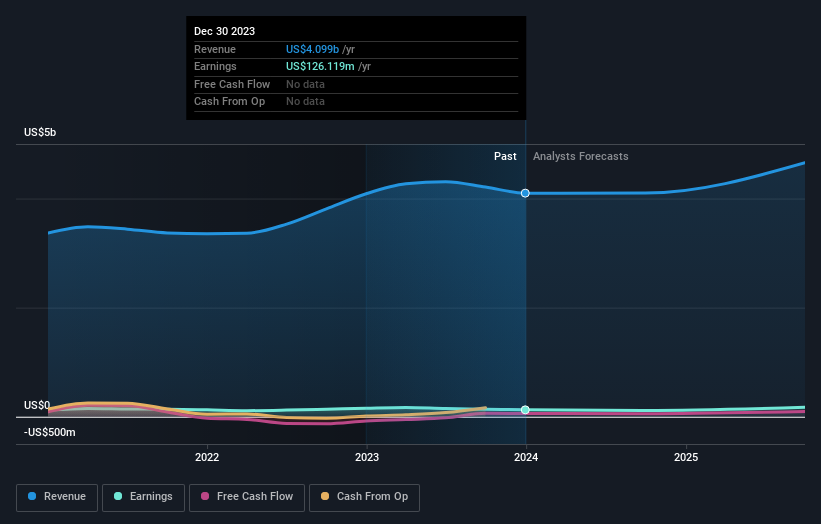- United States
- /
- Electronic Equipment and Components
- /
- NasdaqGS:PLXS
Plexus Corp. (NASDAQ:PLXS) Just Released Its First-Quarter Earnings: Here's What Analysts Think
Plexus Corp. (NASDAQ:PLXS) shareholders are probably feeling a little disappointed, since its shares fell 5.4% to US$93.03 in the week after its latest quarterly results. Results were roughly in line with estimates, with revenues of US$983m and statutory earnings per share of US$1.04. Following the result, the analysts have updated their earnings model, and it would be good to know whether they think there's been a strong change in the company's prospects, or if it's business as usual. So we gathered the latest post-earnings forecasts to see what estimates suggest is in store for next year.
See our latest analysis for Plexus

Following last week's earnings report, Plexus' five analysts are forecasting 2024 revenues to be US$4.10b, approximately in line with the last 12 months. Statutory earnings per share are expected to decline 11% to US$4.09 in the same period. Before this earnings report, the analysts had been forecasting revenues of US$4.20b and earnings per share (EPS) of US$5.03 in 2024. The analysts seem less optimistic after the recent results, reducing their revenue forecasts and making a substantial drop in earnings per share numbers.
The analysts made no major changes to their price target of US$104, suggesting the downgrades are not expected to have a long-term impact on Plexus' valuation. That's not the only conclusion we can draw from this data however, as some investors also like to consider the spread in estimates when evaluating analyst price targets. The most optimistic Plexus analyst has a price target of US$115 per share, while the most pessimistic values it at US$90.00. With such a narrow range of valuations, the analysts apparently share similar views on what they think the business is worth.
Looking at the bigger picture now, one of the ways we can make sense of these forecasts is to see how they measure up against both past performance and industry growth estimates. It's pretty clear that there is an expectation that Plexus' revenue growth will slow down substantially, with revenues to the end of 2024 expected to display 0.02% growth on an annualised basis. This is compared to a historical growth rate of 7.0% over the past five years. By way of comparison, the other companies in this industry with analyst coverage are forecast to grow their revenue at 5.2% per year. Factoring in the forecast slowdown in growth, it seems obvious that Plexus is also expected to grow slower than other industry participants.
The Bottom Line
The biggest concern is that the analysts reduced their earnings per share estimates, suggesting business headwinds could lay ahead for Plexus. Unfortunately, they also downgraded their revenue estimates, and our data indicates underperformance compared to the wider industry. Even so, earnings per share are more important to the intrinsic value of the business. The consensus price target held steady at US$104, with the latest estimates not enough to have an impact on their price targets.
With that said, the long-term trajectory of the company's earnings is a lot more important than next year. We have estimates - from multiple Plexus analysts - going out to 2025, and you can see them free on our platform here.
You can also see whether Plexus is carrying too much debt, and whether its balance sheet is healthy, for free on our platform here.
Mobile Infrastructure for Defense and Disaster
The next wave in robotics isn't humanoid. Its fully autonomous towers delivering 5G, ISR, and radar in under 30 minutes, anywhere.
Get the investor briefing before the next round of contracts
Sponsored On Behalf of CiTechNew: Manage All Your Stock Portfolios in One Place
We've created the ultimate portfolio companion for stock investors, and it's free.
• Connect an unlimited number of Portfolios and see your total in one currency
• Be alerted to new Warning Signs or Risks via email or mobile
• Track the Fair Value of your stocks
Have feedback on this article? Concerned about the content? Get in touch with us directly. Alternatively, email editorial-team (at) simplywallst.com.
This article by Simply Wall St is general in nature. We provide commentary based on historical data and analyst forecasts only using an unbiased methodology and our articles are not intended to be financial advice. It does not constitute a recommendation to buy or sell any stock, and does not take account of your objectives, or your financial situation. We aim to bring you long-term focused analysis driven by fundamental data. Note that our analysis may not factor in the latest price-sensitive company announcements or qualitative material. Simply Wall St has no position in any stocks mentioned.
About NasdaqGS:PLXS
Plexus
Provides electronic manufacturing services in the United States, the Asia-Pacific, Europe, the Middle East, and Africa.
Flawless balance sheet with solid track record.
Similar Companies
Market Insights
Weekly Picks

Early mover in a fast growing industry. Likely to experience share price volatility as they scale


A case for CA$31.80 (undiluted), aka 8,616% upside from CA$0.37 (an 86 bagger!).


Moderation and Stabilisation: HOLD: Fair Price based on a 4-year Cycle is $12.08
Recently Updated Narratives


Title: Market Sentiment Is Dead Wrong — Here's Why PSEC Deserves a Second Look


An amazing opportunity to potentially get a 100 bagger

Amazon: Why the World’s Biggest Platform Still Runs on Invisible Economics
Popular Narratives


Crazy Undervalued 42 Baggers Silver Play (Active & Running Mine)


MicroVision will explode future revenue by 380.37% with a vision towards success


NVDA: Expanding AI Demand Will Drive Major Data Center Investments Through 2026
Trending Discussion


